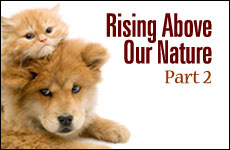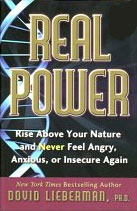 Iran’s Attack on Israel
Iran’s Attack on Israel


8 min read
When we accept responsibility for our lives, then nothing can stop us.
Our ability to maintain self-control helps us to make better choices. Consequently, our self-esteem is increased, which automatically deflates the ego. A smaller ego, of course, means greater perspective. Greater perspective, in turn, makes it easier for us to maintain self-control, and so the process moves forward or backwards, depending on our willpower to rise above our nature and make good choices.
This process of growth appears to be a closed system, in which every component depends on the previous one to exist, and progression or regression moves incrementally. Enhanced emotional health can be achieved by bypassing this measured process, and moving past this closed circuit. Beyond taking immediate action when we are inspired by flashes of perspective, being able to accept ourselves completely organically purges the ego, which automatically taps us into an undistorted reality.
The First Cause
When we look to creation itself, we find that there has to be a first Cause -- and we know this Cause to be God. We can have creations (living beings, animate and inanimate forces, and objects) that were created by other entities, but as we go back in time, we discover that something outside of this closed system had to have been responsible for setting things in motion. We cannot have everything depending on something else -- some force had to be independent. God is that independent force which "began" our universe.
Our own first cause is the recognition that we are independent.
Since we are created in the image of the Creator, there must be a first cause within us but, at the same time, beyond us. There must be a way to move forward that is "outside of the circle" whenever we choose. So what can we, as finite beings, bring to life that is completely independent of ourselves?
Our own first cause is the recognition that we are independent. The Sages state, "How precious is man for he was created in the image of God." The God-given gift of free will bestowed upon all human beings, however, is secondary to the Divine gift of awareness. As the Talmud says, "A greater sign of our preciousness to God is that He told us we were created in the image of God." (Ethics of the Fathers 3:18).
God, being non-physical, does not have a form, so what do we mean when we speak of man being created in the image of God? It means that human beings have the freedom to forge their own reality. In that way we resemble God, Who is completely free and independent.
Free will gives human beings the ability to rise above their nature. This gift was not bestowed on any other creature, as illustrated in the classic Aesop's fable about the turtle and the scorpion.
"Would you help me cross the river?" the scorpion asked the turtle. "Jump on!" says the turtle, "but you have to promise not to sting me." "I promise," the scorpion says, emphatically. He then jumps on. The turtle swims across the river. Just as they get to the other bank, the scorpion stings the turtle. "Why did you sting me?" asks the turtle painfully as he takes his last breath and sinks under the water. "I had to," the scorpion answers.
Animals are incapable of repressing their urges and exercising self-control. Their actions reflect their desires. When we, however, as human beings, utilize our free will, we become partners in our own creation. That is why it is said that the purpose of creation rests on free will.
All positive change begins with some version of, "I am responsible and nothing in my life will change for the better unless I change."
As long as we believe that the quality of our lives is a result of circumstances, rather than a result of our own proactive choices and response to situations, we remain powerless. All positive change begins with some version of, "I am responsible and nothing in my life will change for the better unless I change." This is not meant to be an affirmation or mantra to be repeated; rather, once we affirm this insight as truth, it is forever a part of us.
Why is acceptance of responsibility the path to self-acceptance? We take responsibility for that which we accept, and we ignore that which we do not want to see. Nothing in nature is irrelevant; everything has a purpose. Our life, and everything in it, must be acknowledged. When we ignore something, anything, no matter how insignificant, we move into the world of falsehood and, by default, suffering. Acceptance of responsibility instantly leads to a wider perspective, as we allow more reality into our view. We have no interest in denying what is necessary to our wellbeing -- for certain, we strive to see clearly. The recently diagnosed diabetic, for instance, is likely to analyze every type of food in his diet. Blaming bad genes, his parents, and a hectic lifestyle fades into insignificance. His focus moves away from what is unproductive.
In the Beginning
When he was created, Adam, the first man, had complete perspective, as the ego was external. As a result of the sin, however, the ego became part of our internal composition. Adam and Eve are told by God that they can eat freely and enjoy everything in the Garden of Eden. They just cannot eat from the Tree of Knowledge of Good and Bad. As we know, a serpent entices Eve to eat fruit from this tree. After she eats from the tree, she gives some of its fruit to Adam. When God confronts Adam and Eve about their actions, "[t]he man said, ‘The woman whom you gave to be with me -- she gave me of the tree, and I ate.' The woman said, ‘The serpent deceived me, and I ate'" (Genesis 3:8–13).
The Midrash says that God asks Adam, ayeka -- "Where are you?" -- to give Adam an opportunity to confess his sin and repent before God speaks again and pronounces punishment. Instead of accepting responsibility, Adam blames his sin on Eve, and Eve blames the snake. Had they acknowledged the wrong, they would have been more readily forgiven. When we accept responsibility for our actions and our lives, we purge ourselves of our ego.
Each situation brings with it the opportunity to excuse our behavior or to take responsibility. It is correct to say, "I am doing this because I cannot control myself," instead of saying, "This is right." The first statement is truthful. The second is a lie.
This cannot be stressed enough. Even when we choose to not take responsibility for our actions, as long as we recognize that we could have behaved differently, our intellectual awareness is raised to a much higher level. This approach stands in contrast to the feeling of being out of control, and perceiving oneself to be a victim of circumstance. Rather than justifying our actions, it is preferable to acknowledge that we have chosen not to act responsibly. By reminding ourselves that we always have a choice, we reinforce the notion that we are responsible, whether or not we ultimately act responsibly. Instead of burying our choices behind the illusion of helplessness, we are facing reality.
Living in the World of Truth
Embracing the knowledge that we are responsible for our actions eventually prompts our soul to act more responsibly, and therefore transform ourselves. We can further advance this process by making it easier to rise above our nature. The first criterion for doing this is that we move our lives in the direction of our soul's longing, rather than reactively going through life with an ego-oriented agenda. Only when we are dissatisfied with the general direction of our lives do we allow the petty annoyances to blow out of proportion, causing us significant stress. In the next chapter we will see how this movement is properly achieved.
We are responsible for our satisfaction with life.
The second criterion is to recognize the effect of our actions. A person, for example, may have a difficult time resisting a favorite unhealthy food, and is only occasionally able to tap into his inner wellspring of discipline. If, however, he develops a life-threatening allergy to this particular food, then his ability to resist is made a great deal easier. Did he suddenly get a boost of self-esteem or willpower? No. The stakes have changed.
Certainly, as we increase self-esteem, we will want to invest in our wellbeing and long-term satisfaction and happiness. Irrespective of our feelings of self-worth, when the cost is just not worth it, we are forced to re-evaluate the situation. From our example we find that even without a change in ourselves, we are driven to change our behavior when we connect completely, to the impact and influence that our actions have on the entirety of our wellbeing.
The job of the ego is to cloak reality, and to hide from us, those consequences. Once we understand the inner workings of human nature, we lift that veil. Then, when a choice presents itself, we will appreciate clearly, what is to be gained, and what is to be lost.
In the end we are responsible for our satisfaction with life, whether we choose to accept this or not. If we accept responsibility for our lives, then nothing can stop us; if we do not, then nothing will move us.
 Real Power offers specific strategies that will enable readers to harness untapped abilities and experience immediate and dramatic change. Click here to purchase.
Real Power offers specific strategies that will enable readers to harness untapped abilities and experience immediate and dramatic change. Click here to purchase.
